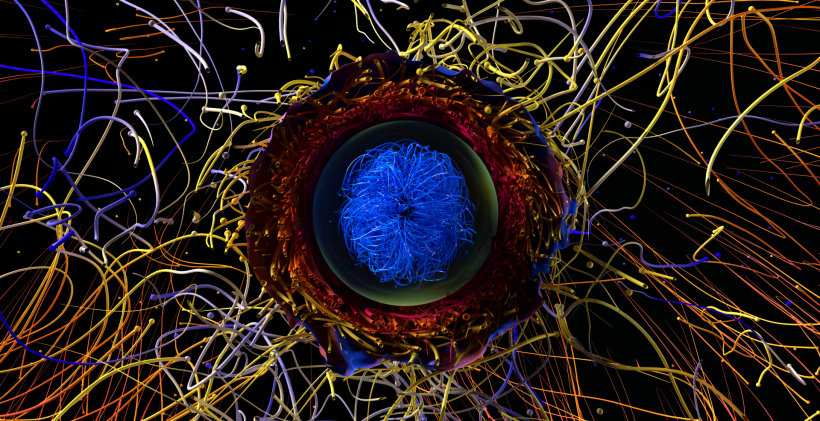Scientists from the U.S. Department of Energy’s Argonne National Laboratory will share the laboratory’s research and expertise in high performance computing (HPC) at the 34th International Conference for High Performance Computing, Networking, Storage, and Analysis. Known widely as SC22, the annual conference will be held November 13-18, 2022. Stop by the DOE Booth #1600 to check out Argonne’s latest research.
Nearly 100 Argonne researchers will attend and participate in activities on topics ranging from exascale technologies and HPC software to AI testbeds and increasing diversity in computing. They’ll be leading tutorials, presenting technical papers, speaking at workshops, participating in birds-of-a-feather discussions and sharing ideas in panels.
In addition, Argonne will participate in the annual Job Fair and partner with other DOE national laboratories to provide talks and demos at the DOE’s conference booth (booth #1600). Argonne’s Bogdan Nicolae will give a talk about the versatility of a searchable lineage for scalable HPC data management.
Some notable Argonne activities are highlighted below. For the full schedule of conference activities, see Argonne’s SC22 participation list.
ACM/IEEE Ken Kennedy Award to Ian Foster
Ian Foster, a Distinguished Fellow and director of Argonne’s Data Science and Learning Division, is being recognized for the establishment of new programming models and foundational science services. Foster, a pioneer in cloud and high-performance computing, was nominated for several influential projects that have helped accelerate scientific discovery in fields ranging from physics and astronomy to climate science and biomedicine.
Gordon Bell Finalist
A multi-institutional team led by Argonne’s Arvind Ramanathan has been named a finalist for the Association for Computing Machinery’s (ACM) Gordon Bell Special Prize for HPC-Based COVID-19 Research for their groundbreaking work to develop the first genome-scale language models (GenSLMs) to explore the evolutionary dynamics of SARS-CoV-2. Using AI and supercomputing resources, the researchers’ foundation models have the potential to transform how new and emergent variants of pandemic-causing viruses, such as SARS-CoV-2, are identified and classified.
Best Paper Finalists
Argonne researchers contributed to two technical papers that are both up for the Best Paper Award and the Best Student Paper Award at SC22. One of the studies presents a framework for mitigating silent data corruptions in HPC applications (authors: Yafan Huang and Guanpen Li, University of Iowa; Franck Cappello and Sheng Di, Argonne National Laboratory; Shengjia Guo, Baidu Research Institute). The other Best Paper finalist details a scheme that uses compiler technologies to enable scalable automatic differentiation for a variety of parallel programming models (authors: William Moses and Valentin Churavy, Massachusetts Institute of Technology; Paul Hovland, Jan Hueckelheim, Sri Hari Krishna Narayanan, Johannes Doerfert, and Michel Schanen, Argonne National Laboratory; Ludger Paehler, Technical University of Munich).
ALCF AI Testbed
Comprised of systems from Cerebras, Graphcore, Groq, Habana, and SambaNova, the Argonne Leadership Computing Facility’s (ALCF) AI Testbed is a growing collection of some of the world’s most advanced AI machines available for scientific research. At SC22, researchers from Argonne and AI companies will host a tutorial on programming these novel AI systems for scientific computing. A team led by Argonne’s Murali Emani will also present a workshop paper that details a first-of-a-kind evaluation of how the AI machines perform with deep learning workloads. The ALCF is a DOE Office of Science user facility at Argonne.
Aurora
Argonne’s Susan Coghlan will provide an update on the status of the lab’s next-generation supercomputing resources, including the Aurora exascale system. Coghlan will also contribute to a session on the roadblocks and key learnings associated with adopting liquid cooling systems for large-scale supercomputers like Aurora.
Diversity in HPC
The Exascale Computing Project’s Broadening Participation Initiative is working to recruit and retain a diverse workforce by fostering a supportive and inclusive culture at DOE national labs. Argonne’s Jini Ramprakash and Lois Curfman McInnes are among the leaders discussing progress toward the goals of this multilab partnership.
Experiment-in-the-Loop Computing
Now in its fourth year, the Extreme-Scale Experiment-in-the-Loop Computing (XLOOP) workshop focuses on research at the intersection of HPC and large-scale experimental science. Chaired by Argonne’s Justin Wozniak and Nicholas Schwarz, the XLOOP workshop will feature papers and presentations detailing how advances in computing, including new AI and data methods, are helping to accelerate discoveries at observational and experimental facilities.

